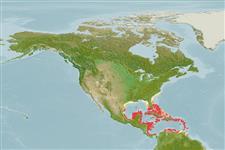Environment: milieu / climate zone / depth range / distribution range
Ecologia
marinhas associadas(os) a recifes. Subtropical; - 9°N
Western Atlantic: Florida, Bahamas, N. & W. Caribbean, & Antilles south to St. Kitts.
Tamanho / Peso / Idade
Maturity: Lm ? range ? - ? cm
Max length : 4.0 cm TL macho/indeterminado; (Ref. 7251)
Descrição suscinta
Morfologia | Morfometria
Espinhos dorsais (total): 15; Raios dorsais (total): 8-9; Espinhos anais 2; Raios anais : 16 - 17. This species is distinguished by the following characters: naked belly, pectoral-fin base, and cheek; adults with spiny preorbital bone; blunt snout; 3 rows of scales above rear pored scales, first 2 rows about equal-sized; first dorsal fin relatively short; fifth body bar prominently darker than first 4 and typically wider than 4-5 interspace; first four body bars are usually indistinct, often barely distinguishable; 4-5 interspace without central dark patch or dark accessory bar; 2 broad and solid dark or dusky red bands on caudal fin (in breeding males all dark); pale band flanked with dark or red stripes from eye across upper jaw; second dorsal fin with 3 rounded dark spots on membranes near the spine bases and thin band of fine speckling on outer rim of fin; anal fin with 4 or 5 dark patches; mode of D III+XII+8 and A II, 16; mode of 15 pored lateral-line scales and 21 scales in notched midline row (Ref. 93957).
Adults inhabit patch reefs and rocky bottoms (Ref. 5521). Eggs are hemispherical and covered with numerous sticky threads that anchor them in the algae on the nesting sites (Ref. 240). Larvae are planktonic which occur primarily in shallow, nearshore waters (Ref. 94114).
Ciclo de vida ou comportamento de acasalamento
Maturidade | Reprodução | Desova | Ovos | Fecundidade | Larvas
Victor, B.C., 2013. The Caribbean roughhead triplefin (Enneanectes boehlkei): DNA barcoding reveals a complex of four West Indian sympatric cryptic species (Teleostei: Blennioidei: Tripterygiidae). J. Ocean Sci. Found. 7:44-73. (Ref. 93957)
Status na Lista Vermelha da UICN (Ref. 130435)
Ameaça para os humanos
Harmless
Uso pelos humanos
Aquário: Espécies comerciais
Mais informação
Nomes comunsSinônimosMetabolismoPredadoresEcotoxicologiaReproduçãoMaturidadeDesovaAgregação de desovaFecundidadeOvosDesenvolvimento dos ovos
Idade/TamanhoCrescimentoPeso-comprimentoComprimento-comprimentoFrequências de comprimentoMorfometriaMorfologiaLarvasDinâmica larvalRecrutamentoAbundânciaBRUVS
ReferênciasAquaculturaPerfil para aquaculturaEstirpesGenéticaElectrophoresesHereditariedadeDoençasProcessamentoNutrientsConversão de massa
ColaboradoresFotosStamps, Coins Misc.SonsCiguateraVelocidadeTipo de nataçãoÁrea branquialOtólitosCérebrosVisão
Ferramentas
Relatórios especiais
Baixar XML
Fontes da internet
Estimates based on models
Preferred temperature (Ref.
123201): 26.3 - 28.2, mean 27.4 °C (based on 531 cells).
Índice de diversidade filogenética (Ref.
82804): PD
50 = 0.5001 [Uniqueness, from 0.5 = low to 2.0 = high].
Bayesian length-weight: a=0.00562 (0.00258 - 0.01228), b=3.08 (2.89 - 3.27), in cm total length, based on LWR estimates for this (Sub)family-body shape (Ref.
93245).
Nível Trófico (Ref.
69278): 2.7 ±0.3 se; based on size and trophs of closest relatives
Resiliência (Ref.
120179): Elevada, tempo mínimo de duplicação da população menor que 15 meses (Preliminary K or Fecundity.).
Fishing Vulnerability (Ref.
59153): Low vulnerability (10 of 100).
Nutrients (Ref.
124155): Calcium = 308 [99, 1,348] mg/100g; Iron = 2.52 [0.83, 6.27] mg/100g; Protein = 18.9 [16.9, 20.8] %; Omega3 = 0.146 [0.030, 0.713] g/100g; Selenium = 31.8 [5.2, 162.5] μg/100g; VitaminA = 22.1 [2.1, 231.9] μg/100g; Zinc = 3.96 [1.54, 8.13] mg/100g (wet weight);
